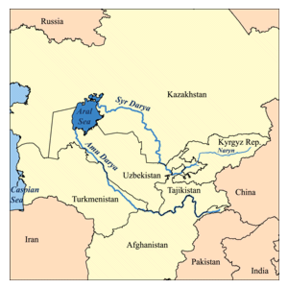Kazakhstan

Kazakhstan is a country in Central Asia, west of the Ural River in Eastern Europe.
Origin of name
The ethnonym "Kazakh" is derived from an ancient Turkic word meaning "independent; a free spirit", reflecting the Kazakhs' nomadic horseback culture. The Persian suffix "-stan" means "land" or "place of", so Kazakhstan means "land of the Kazakhs".
List of cities of Kazakhstan
The following is a list of cities with more than 50,000 inhabitants in Kazakhstan.
Aktau,
Aktobe,
Almaty,
Arkalyk,
Astana,
Atyrau,
Baikonur,
Balkhash,
Jezkazgan,
Karaganda,
Kentau,
Kyzylorda,
Kokshetau,
Kostanay,
Zhanaozen,
Pavlodar,
Petropavl,
Ridder,
Saran Kazakhstan,
Satpayev,
Semey,
Stepnogorsk,
Taldykorgan,
Taraz, (Ancient)
Temirtau,
Turkistan, (City, Ancient)
Oral,
Oskemen,
Shymkent,
Shahtinsk,
Shchuchinsk,
Ekibastuz,
History
Kazakhstan has been inhabited since the Neolithic Age: the region's climate and terrain are best suited for nomads practicing pastoralism. Archaeologists believe that humans first domesticated the horse in the region's vast steppes.
Central Asia proper was originally inhabited by Indo-Iranians. The best known of those groups was the nomadic Scythians.[1] The Turkic people began encroaching on the Iranians starting at least in the 5th century AD, possibly earlier. They became the dominant ethnic group of Central Asia. While ancient cities Taraz (Aulie-Ata) and Hazrat-e Turkestan had long served as important way-stations along the Silk Road connecting East and West, real political consolidation only began with the Mongol invasion of the early 13th century. Under the Mongol Empire, administrative districts were established, and these eventually came under the rule of the emergent Kazakh Khanate (Kazakhstan).
External links
References
Back to Places

